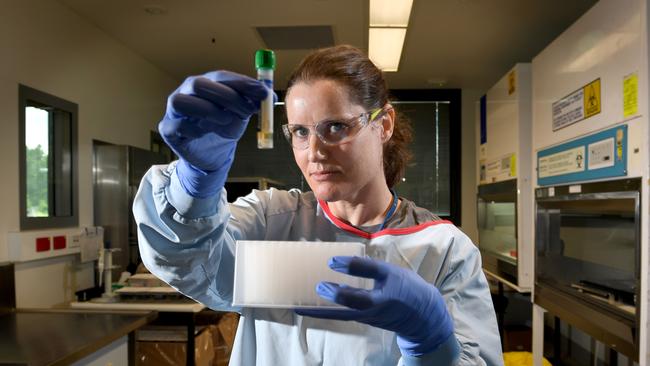Experimental treatment to be used on Aussie COVID-19 patients
A drug used to treat ebola will be used to treat COVID-19 patients in a clinical trial in Australia and a TB vaccine will be trialled to protect health workers from the virus.
Illness
Don't miss out on the headlines from Illness. Followed categories will be added to My News.
Experimental antiviral therapy remedsivir could soon be given to Aussies with COVID-19 as part of a clinical trial to be rolled out in 50 hospitals.
The World Health Organisation has described the treatment, being trialled in China, as the most promising therapy for COVID-19 and it has launched a worldwide trial of the drug.
Originally developed to beat the 2009 Ebola outbreak, it works to slow viral infections by blocking viral replication.
Viral replication is the formation of biological viruses during the infection process in the target host cells. Viruses must first get into the cell before viral replication can occur.
The drug was not successful against Ebola but has shown promise in treating coronavirus.
Australian Society of Infectious Diseases president Professor Josh Davis told News Corp he was applying to have it included in the same clinical trial that will test other promising therapies – HIV treatment Kaletra and malaria treatment Hydroxychloroquine on COVID-19 patients.
There is currently no stock of remedsivir in Australia and Professor Davis said he was in discussions with pharmaceutical company Gilead and hopes to get it into the country within 1-2 months.
“We are in discussions with Gilead and we want to put that in the trial as well,” he said.
Meanwhile, researchers at Melbourne’s Murdoch Children’s Research Institute (MCRI) announced yesterday they are about to embark on a trial of the TB vaccine to combat coronavirus in frontline health workers.
Even though TB is a bacterial infection and COVID-19 is a virus previous studies have shown that the vaccine can boost the immune system, researchers said.
The trial will be conducted with 4000 health workers in hospitals around the country to determine if it is effective against COVID-19.
Similar trials are being conducted in other countries including The Netherlands, Germany and the UK.
Overnight the US Food and Drug Administration approved the use of blood plasma from people who have recovered from COVID-19 to treat people sick with coronavirus.
The plasma includes antibodies to COVID-19 and the theory is by injecting it into sick people it will boost their immune response to the virus.
There are fears that the race to develop treatments and vaccines against COVID-19 could be derailed if the virus mutates like influenza.
However, scientists who have studied 1000 different samples of COVID-19 have found it is highly stable, unlike the flu, which mutates rapidly so making a vaccine should be easier and one shot might last a lifetime.

Peter Thielen, a molecular geneticist at the Johns Hopkins University in the US reportedly found only about four to 10 genetic differences between the strains that have infected people in the US and the original virus that spread in Wuhan.
The government has moved to expand the number of people who can be tested for COVID-19 and this will be helped by the roll out of a new 15 minute COVID-19 test kit across Australia next week.
The 15-minute Antibody test from Endo X requires a drop of blood to check for antibodies to the virus and return results in 15 minutes.
It will help essential workers such as doctors, nurses, and teachers, and the general public in return to their jobs more quickly if they fear they have been exposed to the virus.
It will allow essential workers to be screened daily and reduce quarantine periods of suspected cases from 14 days to five.
The test only works if it is taken four days after the person was infected with the virus.
Dr. David Badov, Director of Endo X, said: “The test will reveal if the patient has antibodies in their blood and are now immune to COVID-19, supporting workers in getting back to their jobs in this time of uncertainty. “
